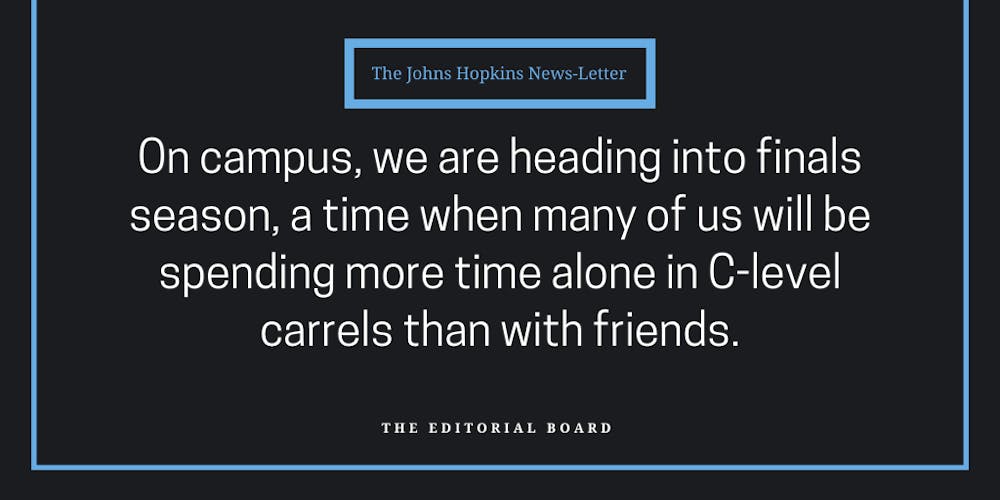This November, we’re seeing more men around campus growing mustaches. While you might assume that the CVS Pharmacy on St. Paul Street has stopped stocking razors, it’s actually for Movember, an annual month-long push to raise awareness for men’s health issues — including prostate cancer, testicular cancer and suicide — by sporting mustaches.
Although males make up 50% of the population, they contribute to nearly 80% of suicides, and male depression often goes undiagnosed. Men can be more reluctant to seek help for mental health issues than those of other gender identities, and this is especially true for college-aged men. While there’s no difference in the number of male and female college students who report mental health issues, females are about 20% more likely to pursue help. Men are also less likely to have close friends to turn to for support.
Although Movember focuses on men’s mental health, people of all gender identities may be struggling right now. This week, we put the clocks back an hour. Though it was nice to get an extra hour of sleep on Sunday, the earlier nightfall can affect our mood for months to come. While it’s a subtle shift in the patterns of daily life, it’s easy to underestimate how important sunlight is for your health.
Some ways to combat the gloom that comes with shorter days are to spend more time exposed to natural light, whether that be to sit in a sunny spot in the library or to open your blinds in the morning. For some people, using light boxes can also be helpful. They emit light at the same frequency as the sun and can offset the effects of getting less daylight. And though it’s getting colder, try bundling up and taking walks outside. One study found that every additional hour spent outdoors significantly lowered the odds of becoming depressed.
It would be remiss not to mention how the recent news cycle may be contributing to feelings of anxiety and depression across campus. The Israel-Hamas war has induced feelings of stress and fear for many, negatively affecting mental health. Beyond the violence itself, the resulting polarization and debate regarding the conflict have also generated tension and worry. The rise of antisemitic and Islamaphobic hate crimes in the U.S. has further compounded unease and anxiety.
While it is important to stay up-to-date, it is also emotionally taxing to be bombarded with images of brutal violence. During this time, take care of your mental health and seek support if needed.
On campus, we are heading into finals season, a time when many of us will be spending more time alone in C-level carrels than with friends. The loneliness and stress of finals season can take a toll, and the lack of natural light in the depths of the library doesn’t help either. It can be difficult, but prioritize your well-being during this time and do things that bring you joy. This can look different for everyone — perhaps a simple 30-minute study break to chat with a friend or even an hour at the gym.
As we navigate this difficult period, check in on your friends and classmates. It can be difficult for those navigating mental health issues to reach out first, so if you notice someone struggling, even the small act of asking them how they are can go a long way.
And to those who aren’t feeling the best right now, we hope that you ask for help, whether it be from a professional, friends or family. You matter and do not have to suffer in silence. The world can be distressing and campus can be isolating, making it all the more important to support one another and practice empathy.
Mental Health Resources
- The John Hopkins University Student Well-Being website serves as a portal for all health and well-being resources across the university.
- The Counseling Center may be contacted by calling (410) 516-8278 on Monday, Tuesday, Thursday and Friday from 8:30 a.m.–5 p.m. (closed 12–1 p.m.) as well as Wednesdays from 1–5 p.m. Please leave a message during the 12–1 p.m. hour or press 1 to reach the on-call counselor.
- If you or someone you know is experiencing a crisis, contact the Behavioral Health Crisis Support Team (BHCST) at 410-516-WELL (9355) to speak with a crisis support clinician available 24/7, 365 days a year. Telephone consultation with BHCST is available to students, faculty, and staff in Washington, D.C.
- Student Outreach and Support is available for appointments and can be contacted at (410) 516-7857 or by emailing studentoutreach@jhu.edu.
- Religious and Spiritual Life can be reached at (410) 516-1880 or by emailing chaplain@jhu.edu.
- 24/7 counseling is also available through TimelyCare. Visit timelycare.com/jhu and use your Hopkins email to log in.
- Employee Assistance Program: Faculty and staff can call the Johns Hopkins Employee Assistance Program at 888-978-1262, for free, confidential help and referrals for emotional or mental health concerns you may have.





